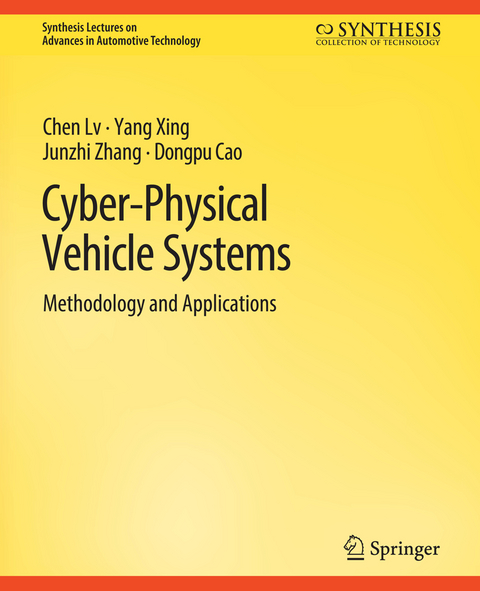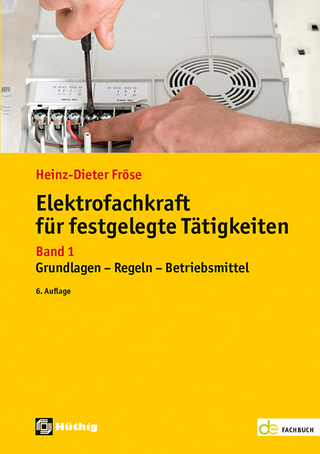
Cyber-Physical Vehicle Systems
Springer International Publishing (Verlag)
978-3-031-00376-9 (ISBN)
Chen Lv is currently an Assistant Professor of School of Mechanical and Aerospace Engineering, Nanyang Technological University. He is also a Cluster Director in Future Mobility Solutions at Energy Research Institute at NTU. He received his Ph.D. from Department of Automotive Engineering, Tsinghua University, China in 2016. He was a joint Ph.D. researcher at EECS Dept., University of California, Berkeley, USA during 2014-2015, and worked as a Research Fellow at Advanced Vehicle Engineering Center, Cranfield University, UK during 2016-2018. He joined NTU and founded the Automated Driving and Human-Machine System Research Group since June 2018. His research focuses on automated driving, human-machine intelligence, and intelligent electric vehicles, where he has contributed 2 book chapters, over 90 papers, and obtained 12 granted patents. Dr. Lv serves an Academic Editor for PLOS ONE, Automotive Innovation, International Journal of Electric and Hybrid Vehicles, and International Journal of Vehicle Systems Modelling and Testing, and he was a Guest Editor for IEEE/ASME Transactions on Mechatronics, IEEE Transactions on Industrial Informatics, Applied Energy, and International Journal of Powertrains. He received the Highly Commended Paper Award of IMechE UK in 2012, the NSK Outstanding Mechanical Engineering Paper Award in 2014, the China SAE Outstanding Paper Award in 2015, the 1st Class Award of China Automotive Industry Scientific and Technological Invention in 2015, the Tsinghua University Graduate Student Academic Rising Star Nomination Award in 2015, the Tsinghua University Outstanding Doctoral Thesis Award in 2016, the Seal of Excellence of EU H2020 Marie Sklodowska-Curie Actions in 2017, the Best Workshop/Special Session Paper Award of IEEE Intelligent Vehicle Symposium in 2018, and CSAE Outstanding Doctoral Dissertation Award in 2018.Yang Xing received his Ph.D. from Cranfield University, UK,in 2018. He is currently a research fellow with the department of mechanical and aerospace engineering at Nanyang Technological University, Singapore. His research interests include machine learning, driver behavior modeling, intelligent multi-agent collaboration, and intelligent/autonomous vehicles. His work focuses on the understanding of driver behaviors using machine-learning methods and intelligent and automated ve hicle design. He received the IV2018 Best Workshop/Special Issue Paper Award. Dr. Xing serves as a Guest Editor for IEEE Internet of Things, and he is an active reviewer for IEEE Transactions on Vehicular Technology, Industrial Electronics, and Intelligent Transportation Systems.Junzhi Zhang received his B.E. in Transportation Engineering and his M.S. and Ph.D. in Vehicle Engineering from the Jiliin University of Technology, Changchun, China in 1992, 1995, and 1997, respectively. From 1998-1999, Dr. Zhang was a Research Associate in Department of Automotive Engineering in Tsinghua University, Beijing, China. In 1999, Dr. Zhang joined Tsinghua University and founded the Hybrid Powertrain Systems Laboratory whose major research interests include modeling, control and diagnosis of hybrid, electric vehicle. Dr. Zhang become a full professor in Department of Automotive Engineering in Tsinghua University in 2008. Dr. Zhang is the author or co-author of more than 50 peer-reviewed publications and 20 Chinese patents.Dongpu Cao received his Ph.D. from Concordia University, Canada, in 2008. He is currently an Associate Professor at Mechanical and Mechatronics Engineering, University of Waterloo, Canada. His research focuses on vehicle dynamics and control, automated driving and parallel driving, where he has contributed more than 100 publications and 1 US patent. He received the ASME AVTT 2010 Best Paper Award and 2012 SAE Arch T. Colwell Merit Award. Dr. Cao serves as an Associate Editor for IEEE Transactions on Intelligent Transportation Systems, IEEE Transactions on Vehicular Technology, IEEE Transactions on Industrial Electronics, IEEE/ASME Transactions on Mechatronics, and ASME Journal of Dynamic Systems, Measurement, and Control. He has been a Guest Editor for Vehicle System Dynamics, and IEEE Transactions on Human-Machine Systems. He serves on the SAE International Vehicle Dynamics Standards Committee and a few ASME, SAE, and IEEE technical committees.
Preface.- Introductions.- Co-Design Optimization for Cyber-Physical Vehicle System.- State Estimation of Cyber-Physical Vehicle Systems.- Controller Design of Cyber-Physical Vehicle Systems.- Conclusions.- References.- Authors' Biographies .
| Erscheinungsdatum | 06.06.2022 |
|---|---|
| Reihe/Serie | Synthesis Lectures on Advances in Automotive Technology |
| Zusatzinfo | X, 78 p. |
| Verlagsort | Cham |
| Sprache | englisch |
| Maße | 191 x 235 mm |
| Gewicht | 185 g |
| Themenwelt | Technik ► Elektrotechnik / Energietechnik |
| Technik ► Fahrzeugbau / Schiffbau | |
| Technik ► Maschinenbau | |
| ISBN-10 | 3-031-00376-4 / 3031003764 |
| ISBN-13 | 978-3-031-00376-9 / 9783031003769 |
| Zustand | Neuware |
| Haben Sie eine Frage zum Produkt? |
aus dem Bereich


